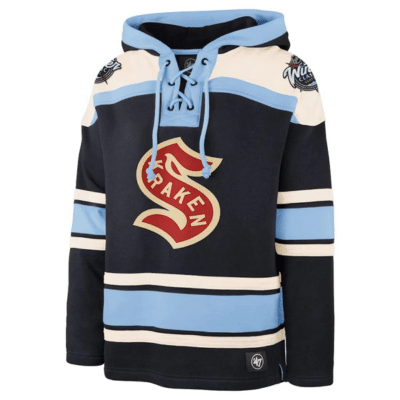Throughout its relatively short time (just three seasons) in the National Hockey League, the Seattle Kraken has been entangled in legal challenges regarding its branding. Its latest conflict, involving a trademark dispute, contains lessons for promo businesses on the sometimes thorny issues surrounding branding and intellectual property.
- Jay Deutsch, CEO and co-founder of Bensussen Deutsch & Associates (PPAI 109381, D14) – ranked the No. 12 distributor in the inaugural PPAI 100 – is a minority owner of the Seattle Kraken.
The latest began at the end of 2023, when a trademark lawsuit was filed against the NHL team for allegedly stealing the “S” logo of the defunct Seattle Metropolitans hockey team and using it on merchandise, The Seattle Times reported.
In addition to seeking damages that include royalties, compensation for Kraken ticket sales and “money necessary for corrective advertising,” the plaintiff has asked a federal judge in Washington state to order the destruction of all Kraken merchandise that improperly uses the “S” logo.
- In September 2023, the Seattle Kraken, NHL and Smack Apparel agreed to voluntarily dismiss a lawsuit that the latter filed in January 2022 after the team and the league had threatened legal action if the Tampa, Florida-based company didn’t stop producing and selling T-shirts featuring Kraken-related branding.
Trademark Lawsuit
Seattle-area resident Paul Kim allegedly obtained the rights to the Seattle Metropolitans’ logo in 2014 to honor its legacy, “long before the NHL approved Seattle’s expansion team in late 2018 or the Seattle Kraken began to play in the 2021-22 season,” according to the complaint filed on December 27, 2023.
- The lawsuit states that Kim has sold or licensed tens of thousands of Metropolitans-branded products since 2015 and used the logo in sponsoring and promoting regional hockey events and programs.
In 2018, Kim reached out to Oak View Group, the predecessor of Seattle Hockey Partners, which owns the Kraken, according to the lawsuit. Kim says Seattle Hockey Partners CEO Tod Leiweke proposed a formal agreement for the franchise’s use of the early 20th-century team’s trademarks in July 2020, offering a single season ticket in exchange for exclusive jersey rights.
“A month later in August 2020, the defendant offered to take a license for 5% of net sales, and with no minimum, no online sales, no resale and no sell off period for existing licensees,” the suit says. “Given that typical industry licenses were in the range of 12% to 15% of all gross sales and included minimum requirements and sell off period for existing licenses, this offer was likewise rejected.”

(The Seattle Metropolitans’ jersey)

(The Seattle Kraken’s Winter Classic jersey)
The Kraken approached Kim again in January 2023, wanting to purchase all of the Metropolitans’ trademarks for a “throwback” campaign for the 2024 Winter Classic, but negotiations ended after the Kraken’s owner offered a one-time payment that, according to the lawsuit, was far less than what the branded merchandise generated in a single year.
Despite the Kraken claiming that it would go “in a different direction” and design its own logo, the team debuted a Winter Classic merchandise line in November with a “virtually identical ‘S,’ red color, white border and white block letter design, including with specific reference to the 1917 Seattle Metropolitans Stanley Cup win,” the lawsuit states.
- Kim alleges that the Kraken uses the same retailers as the Metropolitans to sell its merchandise, confusing consumers by creating a false association between the teams.
Kraken’s Rebuttal
In January, the Kraken filed a motion to dismiss the trademark suit, arguing that Kim filed on the eve of the Winter Classic to try to force a licensing deal.
- In its motion, the Kraken confirmed that Kim contacted the franchise in 2018 to gauge interest in licensing the Metropolitans’ “S” logo, but that the team decided against reusing the historic team’s name.
- The Kraken also confirmed discussions with Kim about using the “S” logo for the Winter Classic, but that the team ultimately chose a derivative of the current logo.
Kim has accused Kraken ownership of federal trademark infringement, false designation of origin and unfair competition, violation of the Consumer Protection Act, common law trademark infringement, unjust enrichment, conversion and tortious interference.
In its motion, the Kraken said that Kim’s claims lack the elements for tortious interference.
- Washington law dictates that the elements for tortious interference must include the existence of a valid contractual relationship or business expectancy, defendants’ knowing about this relationship and intentional interference that causes a breach of that expectancy.
“Kim doesn’t identify any specific business relationship with identifiable third parties to demonstrate a valid business expectancy, and because he hasn’t identified any such business relationship, he necessarily hasn’t, and indeed can’t, allege that the Kraken knew of this relationship,” the motion says.
As far as Kim’s claim of conversion, the Kraken said that he hasn’t shown that he was deprived of his intellectual property or “offered any explanation as to how the Kraken have actually deprived Kim of possession of his trademarks.”


